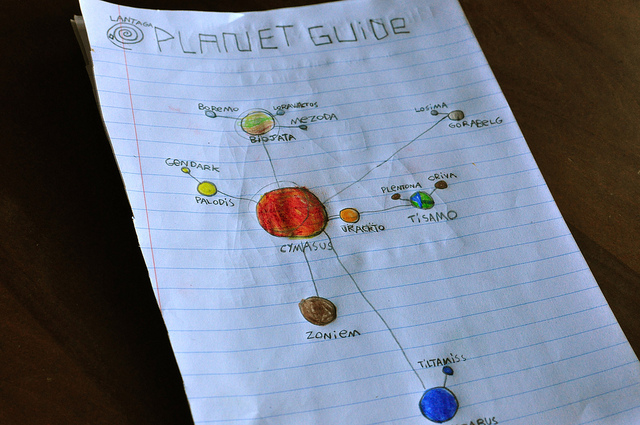
Okay gang, I’m hoping to drum up some audience participation with this post. I’m posing a simple question at the end of this, the latest entry in a series, and I hope you’ll consider answering it with a comment.
The other day I was talking to a mom about taking dictation from her son. As she transcribed his story, she felt that she had to continually urge him along, suggesting options and possibilities.
“Is that okay?” she wondered. “For me to help him so much?”
I think what determines whether a writing technique is okay or not okay is how the child responds to it. “Did it bother him that you offered help?” I asked. “Or did it help him?”
She said that it helped him, but I still sensed that she was uneasy with how the dictating session went. I think she felt that it shouldn’t have been so difficult to drag the story out of him.
She’s probably right. I didn’t think about it at the time because our conversation took a different turn, but if a child is struggling with a piece of writing, you might want to stop and try something else.
First of all, stories are not the ideal writing form for every kid. (Big aside: It’s funny to me how schools and many parents tend to encourage fiction from young kids, and nonfiction—reports and essays—from older kids. Young kids should be encouraged to try nonfiction; many will be more comfortable working in this format. Likewise, older kids should be allowed to work with short stories, novels, poetry, scriptwriting and all other manner of fiction. I think adults worry that we need to let young kids play, and that we need to prepare our older kids. We go overboard and try to teach our teens the sort of writing we imagine they’ll need in their future lives. But what kids really need is an ability to express themselves clearly and with personality on paper. They’ll gain that with regular experience writing about what they care about, in genres that work for them. Once they’ve developed confidence on a page, they’ll be able to tackle any format someone throws at them, even academic writing, fairly quickly. They shouldn’t have to spend four years learning how to write an essay.)
Back to the stories. It could be that fiction isn’t an easy form for my friend’s son, or it could be that this particular story just wasn’t working for him. A few posts back I wrote about starting with a child’s unique interests when looking for dictation topics. If your child is struggling with a piece of dictation, or struggling to find a topic, ask yourself this:
What is the thing that gets this kid worked up? What is the topic that he or she yammers on and on about, day in and day out?
Every kid has something, if you listen. I’m convinced of this. And like I said in my other post, it may not be a topic that you enjoy:
Don’t discount the things you might rather not talk about: Pokemon characters, American Girl doll outfits, the Super Mario brothers, Webkinz. Try to get over your disapproval and listen. The trick is to find what captivates your kid and start there.
Did you read the comment from Jill the other day? If you missed it, I dare you to read it without getting goosebumps:
“Hey – Just wanted to share a story. I’m student teaching in a 5th grade classroom. During Writer’s Workshop yesterday, a lot of kids were able to dive in to their writing after listening to a story and being offered some good prompts. One boy was stuck. Stuck stuck stuck. I saw him talking with a classroom volunteer – they made a list of things he could write about. Five minutes later he had “Green Day” written as a title, but the rest of the page was blank and he was still stuck. I grabbed a pencil and said, “Tell me about Green Day.” He started talking, I started writing. Within just a few minutes, he had a page full of wonderful writing with a little personal history and great connections to song lyrics. Better still, he had increased confidence that he was indeed a writer. Today, I took a little dictation from him during writing time, then he got a pencil and continued on his own. Yay!”
Yay indeed! Jill was smart to recognize that taking dictation might be a way of unstucking this kid; she was even smarter to start with the phrase “Tell me about Green Day.” Clearly, this freed the boy up. He didn’t have to write a story, or an essay, or a coherent piece of any sort. He only had to tell what he knew. And he knew a lot! After one dictation session “he had increased confidence that he was indeed a writer.” And the next day only required a bit of dictation to get him going on his own.
This is what you want to do with your own kids. You are trying to encourage self-expression on the page, so get them started with what they naturally want to express! Get them talking about what thrills them, and get the words down. Don’t worry about a product just yet. Your child doesn’t have to dictate a story! You can always shape the work later, if the child wants to make it into a different type of writing.
Here’s what Mr. T yammers on about: fictional worlds filled with fictional creatures. He talks endlessly about planets he’s created, and the opposing forces that live there. Sure, this sort of passion lends itself to story writing, and T loves fiction. But he also enjoys conveying this information in a nonfiction style. Based on what he talks about, here are some nonfiction formats (based on a very fictional topic!) that would be natural for him to dictate:
- a list of creatures from a particular planet
- descriptions of some of those creatures
- descriptions of the geography of a planet
- the glossary of a language for a particular species
- descriptions of the armor and weapons of different species (ignoring my waldorf guilt)
- a tree showing how different species are sorted into different types (because this is the sort of thing he talks about; do you catch the Pokemon influence?)
And so on. Mr. T actually compiles this sort of writing, along with maps and drawings, into journals he calls information guides. He tends to do this sort of graphic-heavy writing on his own, simply because this is what he enjoys doing. But we could easily expand it into longer descriptions, through dictation, if that’s what he chose to do.
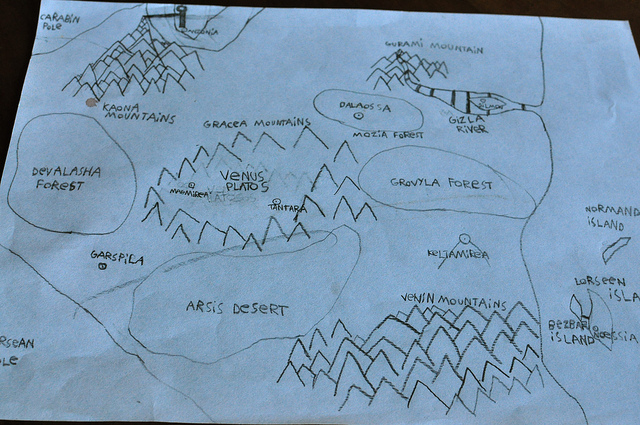
map of a land
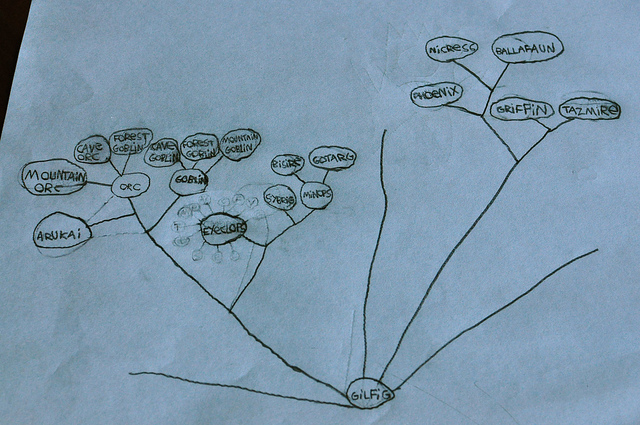
tree of creatures
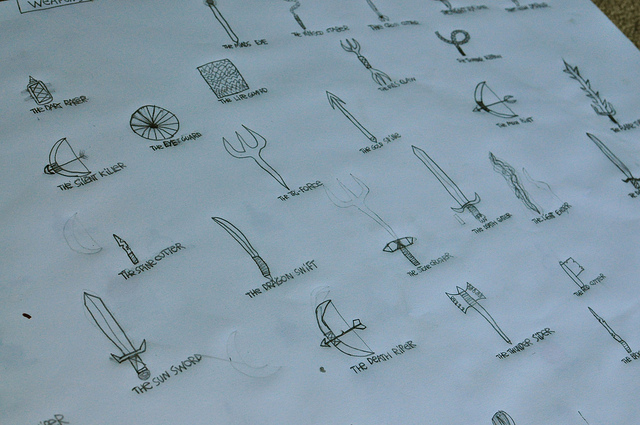
types of weapons
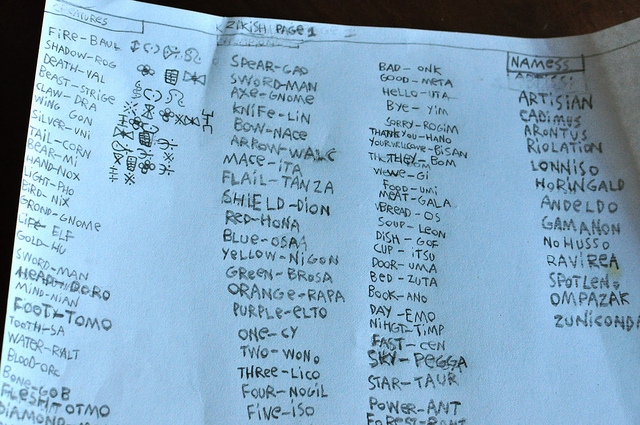
glossary of the “zikish” language
A kid who is passionate about the rain forest, say, or friendship bracelets, or skateboard tricks, or life on the prairie in the 1800s might dictate similar, nonfiction-style writing. Pay attention to the types of nonfiction books your kids like to read, or have read to them. This may also give you ideas about formats to try.
Just begin with what thrills your child and ask the question. “What can you tell me about __________.”
See where it leads you. It may be much simpler for your child than dictating a story.
* * *
Here’s the audience participation portion of the show: what is one thing that your child loves to talk about? Could you leave a comment and tell us? Wouldn’t it be fun to see a long list of all wondrous, quirky things that thrill our kids?
Bonus points, only for the intrepid: considering this particular interest, and your particular child, is there a specific sort of writing that your child might like to try?

My seven-year-old son: Legos sets, especially Hero Factory, and the universe he and his friend have created out of Legos that includes ninjas, wild barbarian robots, and wizards.
Kind of writing he might like: comic book style stories, labeled maps, genealogies of Lego characters, reviews of different Lego sets, histories of evolution of Lego sets, lists of Lego sets he lusts after right now and why he’s interested in them, lists of battles or turning points in his made-up universe’s history, labeled pictures of his ninja fortress’s key features, letters to Lego characters (we’ve already done this one in his “magic mailbox” which yields “replies” from the imaginary penpals)
My four-year-old daughter: princesses in distress who have to escape from their captors or tormentors
fiction, descriptions of different princesses and how they are dressed, letters to princesses, lists of favorite princess stories, labeled maps of princess lands
Fabulous! So many great writing ideas based on your kids’ interests. And I love the magic mailbox! What a fun way of encouraging meaningful writing. I will be sure to pass that idea along.
This one cracked me up: “lists of battles or turning points in his made-up universe’s history”. Yep, my T has never thought of making such a list, but I’ll bet he’d like to!
Today my daughter announced, “I’m tired of ‘writing’ letters and I don’t want to write a story.” I turned and straightened up some papers (and thought fast) and said, “Ok then. You don’t have to write a story…(pause)…But before you go out and play will you help me come up with some treasure hunt clues for your sister’s upcoming birthday treasure hunt?” She was off.
This post made me realize I could ask her to describe what her dream horse looks like, and if she could design a barn how would it be? That ought to keep us going for awhile…
A treasure hunt was a great way of encouraging writing. Real, authentic writing–for her sister’s birthday!
It’s hard when they suddenly say they don’t want to do something, especially if it’s something they enjoyed previously. With writing, I think it’s fine to let it go if they just aren’t in the mood. I’m not always in the mood to write, and writing is one of my great passions! Around here, we don’t write every day. Some days you just need to absorb or stew rather than generate new stuff. And if you feel like you’re having too many days like that, you could always get back into the swing by helping your daughter brainstorm a list of ideas that she could write about. Coming up with ideas for another day can seem less threatening than actually writing something–but by the time kids get to the end of their lists, they’re often inspired to write (or dictate)!
Mr. T’s maps and lists and diagrams remind me so much of my son at his age. He used to make up his own Yu-Gi-Oh cards but now at age 15 he’s on to a new obsession. This is what I listened to ad-nauseum last night: “over-clocking” (huh?), port adapters, RAM vs ROM, fans and cooling systems. Yep. He’s attempting to build a computer in the basement. When he’s not on the advantages of building your own computer, he’s hitting me with philosophical questions like: Is it ever ethical to eat meat (Thank you Julian Baggini “The Pig Want to Be Eaten”) or how about “Is it always better to practice what you preach”?
Meanwhile, I realized the middle child (age 12) has been remarkably quiet (no doubt she can’t get a word in edgewise with the other two yapping away). Last year her obsession was garden gnomes. She still has a garden gnome thing going — she created her own garden gnome hat knitting pattern. The hat looks hilarious but she loves it! (ssh, she’s making one for her sister for Christmas)
The third (age 6) is obsessed with natural disasters, ancient China, on being blind and just the human body in general. This morning on her way to school she asked: “How thick is your skull? Do you think its as thick as three pennies? Do you think its as hard as cement? What do red cells do with oxygen anyways?” Okay I better get myself an anatomy book ’cause I don’t know about you, but I don’t really know how thick your skull is (maybe mine’s thicker than others!) The being blind thing has been evolving for awhile. In the summer she was walking around with her eyes closed to see how it would feel and was asking questions about how a blind person would know colour. Then, this week she discovered a book in school on Helen Keller so now she wants to know all about Helen Keller.
Talk about quirky! I love that all this thinking and wondering is happening under a single roof.
I just noticed that your kids are spaced about the same distance apart as mine–I’m just a few years ahead of you. It’s an interesting spacing, isn’t it? Sounds like your youngest is as chatty and curious as mine. Guess that’s inevitable, when you’re influenced by siblings who are so much older.
Cecil is really interested in designing clothes. She makes them for her stuffed animals and photographs them. She draws dresses for girls (but she doesn’t like to wear dresses). Recently she decided to make a catalog of her dress drawings.
With her interest above, there’s obvious potential for non-fiction expression. I think I will ask her if she’d be willing to label some of the drawings or identify some of the accessories. I’ll suggest that she might want to make a table of contents of dress names.
But as a means of drawing out more details, I’ll use dictation. I’ll ask her if she would like to imagine a character wearing one of the dresses to an event and dictate a story about that–if she’s interested.
Our typical experience is that I have an expectation that she does some sort of writing, but what she writes is up to her. I ask her if she has her own idea, which she often does. If she doesn’t I ask her if she’d like me to suggest some. I give her an out to bash my ideas reasoning aloud that because I’m not her, they might be all wrong–until she lands on something that she can relate to. Depending on the idea, she may work on it independently or I may dictate it, or both.
I look forward to the time that she will be inspired to write on her own, but I think in the meantime, the constancy of doing some kind of writing on a regular basis in a collaborative effort is helping her.
C. and her sewing/fashion design remind me so much of Lulu! She drew outfits and costumes for years. Whenever we studied a new era in history, she always wanted to research and draw the clothes of the time. And she drew lots and lots of her own designs.
If C. wants to make a catalog of her designs, it might be fun to read some clothing catalogue descriptions. There’s a real style to catalogue copy, and it might be fun to try to mimic it, even if she does it in a tongue-in-cheek way. (Remember the whole J. Peterman/Seinfeld thing?)
Then again, that idea might not interest her at all, as you acknowledge. She’s lucky to have a mom who is willing to make suggestions–but just as willing to let them go if they don’t appeal.